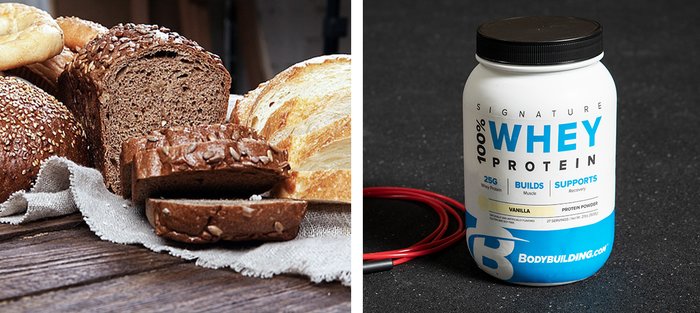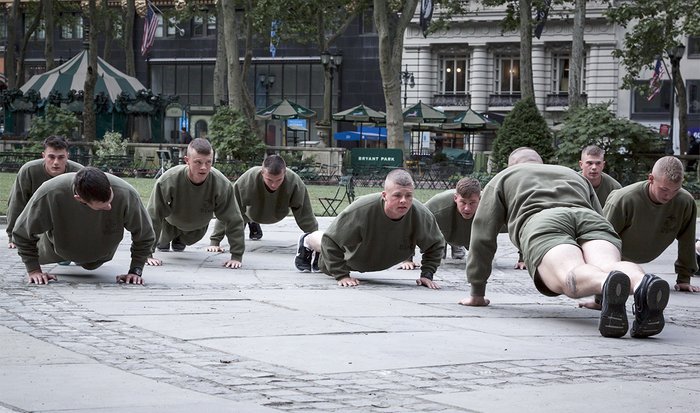Bill Campbell, PhD, CSCS, FISSN
December 13, 2018
•
3 min read
The post-workout protein shake is such a classic part of gym culture, it can be easy to forget that outside of the gym, it’s not always the norm.
Take the military, for instance. Soldiers and service personnel of all types, in all countries, train as hard as anyone, and not only that, they’re regularly forced to prove their hardiness through fitness tests. But when the hard work is done, they’re as likely to receive a carb-rich sports drink for their efforts as a shake. A 2010 study found that only around 18 percent of US military personnel regularly used protein or amino acids.[1] Although that number may have gone up in recent years to match a wider societal acceptance of protein supplements.
But would a greater emphasis on supplemental protein actually make any difference in soldiers’ fitness levels or performance on PTs? A new study looked at just that.
A Nutritional Showdown at Basic Training
This double-blinded study compared the effects of whey protein versus a carbohydrate placebo on body composition and physical performance in Army Initial Entry Trainees at Auburn University.[2] Initial Entry Training is the first step in a soldier’s military career, and has one goal: transforming civilians into soldiers! The program is physically demanding, consisting of large volumes of both strength and endurance training.

In this study, soldiers supplemented twice daily with one of two supplements:
- Hydrolyzed whey protein concentrate: 39 grams of protein per serving, and approximately 80 grams per day
- The same amount of calories from a carbohydrate placebo
In both cases, the supplements were split into two daily servings: following morning physical fitness training, and before bedtime. The researchers measured both body composition and a basic physical performance assessment before and after the eight-week period. The test consisted of:
- 2-minute push-up test
- 2-minute sit-up test
- 2-mile run test
Here’s what they found.
Body composition: On average, soldiers in the whey group lost 4 pounds more fat mass than soldiers supplementing with the carbohydrate placebo. Given that total calorie intake was the same in both groups, this finding points to the potential unique fat-burning property of whey—and the idea that calories from whey shouldn’t be counted on equal footing with other calories, especially when someone is training regularly.
It’s no surprise to me, though. I was involved in a study where we fed a group of hard-training women over 400 extra calories of pure protein for eight weeks, and we also saw surprising levels of fat loss. You can read about it in the article “How Much Protein Do Women Really Need?”
Performance: When it came time to do the physical test, the protein group’s improvements were also superior. In fact, on average they completed nearly seven more push-ups as compared to the carbohydrate group. There were no differences between groups in the sit-up or 2-mile run tests.

The push-up test is a requirement for graduation from the program. An improvement of seven push-ups in this test could literally be the difference between graduating and not graduating from this intense training program!
The Upshot for You
The scientific support for the benefits of whey protein supplementation continues to accumulate, not only when it comes to body composition, but also physical performance. If you’re in the military—or just in a brutal program like the late fitness icon Greg Plitt’s MFT28 Military Fitness Trainer—a shake or two a day could help you not only keep up with the physical demands, but translate them into results.
The ideal time to supplement with whey protein is right after exercise, but if you’re going to have a second shake, consider having it before bed. In the Physique Science Laboratory at the University of South Florida, we provide all subjects in our studies with 25 grams of whey protein immediately post-workout.
References
- Lieberman, H. R., Stavinoha, T. B., McGraw, S. M., White, A., Hadden, L. S., & Marriott, B. P. (2010). Use of dietary supplements among active-duty US Army soldiers. The American Journal of Clinical Nutrition, 92(4), 985-995
- McAdam, J., McGinnis, K., Beck, D., Haun, C., Romero, M., Mumford, P., … & Roberts, M. (2018). Effect of Whey Protein Supplementation on Physical Performance and Body Composition in Army Initial Entry Training Soldiers. Nutrients, 10(9), 1248.
from Weight Loss Insider https://ift.tt/2Cehao8
via Best Weight Loss Supplement

0 comments:
Post a Comment